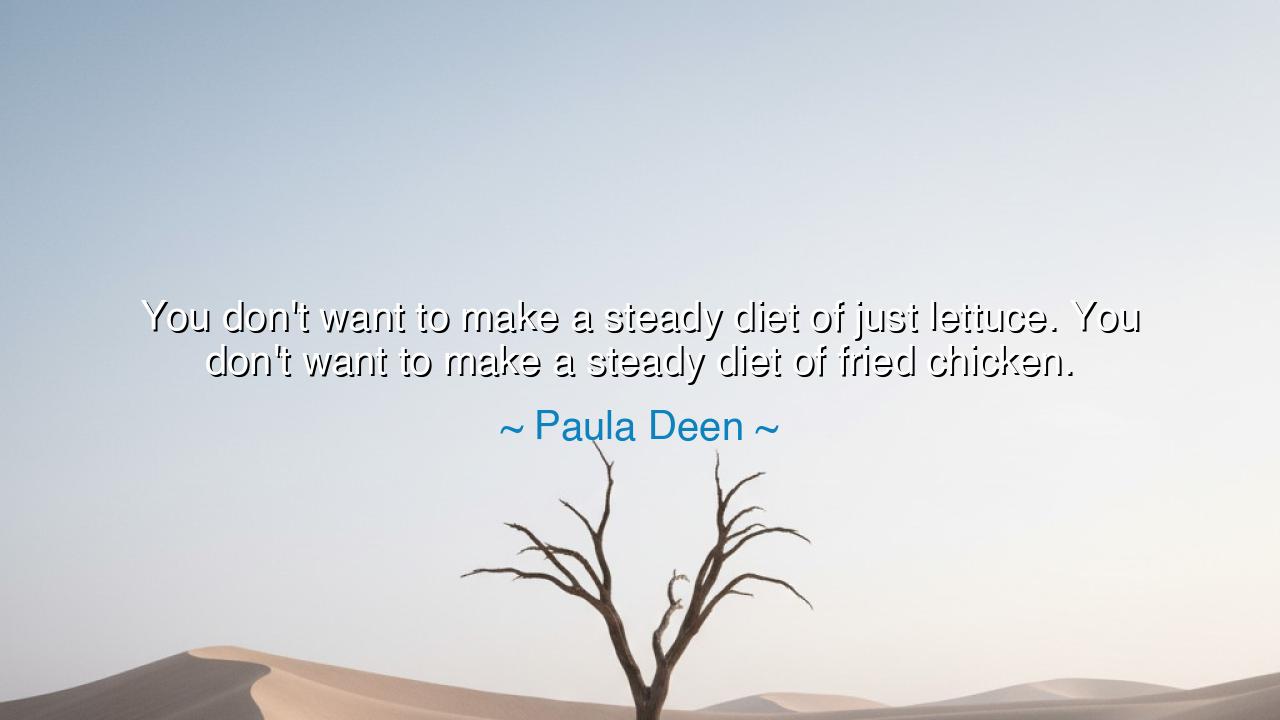
You don't want to make a steady diet of just lettuce. You don't
You don't want to make a steady diet of just lettuce. You don't want to make a steady diet of fried chicken.






In the great dance of life, where the body and soul are partners in a journey toward well-being, there exists an ancient truth—balance is the foundation upon which all things rest. Paula Deen offers this wisdom in her simple yet profound words: “You don’t want to make a steady diet of just lettuce. You don’t want to make a steady diet of fried chicken.” This declaration speaks to the delicate interplay between indulgence and restraint, the wisdom of moderation that the ancients knew well. It is a reminder that the pursuit of health and vitality is not found in extremes but in the balance between nourishment and indulgence, simplicity and richness.
The ancient Greeks, whose philosophy still echoes in the halls of wisdom today, understood this balance better than any. Hippocrates, the father of medicine, is famously quoted as saying, “Let food be thy medicine and medicine be thy food.” He believed that health was not achieved through the extreme consumption of any one thing but through a varied and balanced approach. To nourish the body, the mind must remain in harmony with the needs of the flesh. Deen’s reminder that neither the lightness of lettuce nor the indulgence of fried chicken should dominate one’s diet speaks directly to the core of this ancient wisdom—moderation is the true key to lasting health.
The Romans, too, who reveled in their grand feasts and bountiful tables, understood the dangers of excess. Though their banquets were rich with meats, fruits, and wine, the wise philosophers of Rome warned against the gluttony that so often accompanied wealth and power. Cato the Elder, in his many writings on virtue and simplicity, advocated for a diet of moderation, one that sustained the body without allowing it to be corrupted by indulgence. He believed that true strength came not from overindulgence but from understanding the needs of the body and feeding it wisely. Just as Deen suggests we avoid making a steady diet of extremes, the Romans practiced the art of eating simply while still finding joy in their meals. To eat with awareness, not to satisfy fleeting desires, was their path to vitality.
In the ancient world, balance in all things—whether in food, thought, or action—was held as the highest virtue. The Stoics, led by Epictetus and Seneca, were particularly vocal about the importance of moderation. They believed that true happiness and strength lay not in the indulgence of the senses but in the mastery of them. This ancient understanding is echoed in Deen’s advice: a steady diet of only lettuce, though healthy, lacks the nourishment and satisfaction of a balanced meal. Similarly, a diet of only fried chicken, though pleasurable in the moment, can lead to imbalance and decay over time. The Stoics understood that our strength lies in the ability to choose wisely and to avoid excess in favor of a harmonious life.
Consider the example of Alexander the Great, whose empire spanned the known world. His soldiers were fed a simple, yet effective diet—one that provided them with the sustenance they needed to march into battle and endure long campaigns. They did not feast on the richest meats nor starve themselves in pursuit of perfection. Instead, their meals were rooted in balance—simple foods that gave them the energy they needed without hindering their endurance. Alexander, though a conqueror of lands, knew that true power came from maintaining strength through moderation, not from the extremes of luxury or privation.
The lesson from Paula Deen’s words, then, is both profound and practical. We must learn to live in balance, honoring the needs of our bodies while resisting the lure of excess or deprivation. It is not about rigid rules or extreme sacrifices, but about choosing wisely—nourishing the body with a variety of foods that fuel us for the journey ahead. Whether it is the lightness of lettuce or the richness of fried chicken, both have their place, but neither should dominate the plate. We must embrace variety and moderation to ensure our bodies remain strong, vibrant, and full of life.
So, as you walk this path of life, remember the wisdom of the ancients and Deen’s simple yet powerful message. Choose not the extremes, but the balance that nourishes both body and soul. Honor your body by feeding it what it needs—not just to survive, but to thrive. And when you sit at the table, whether it be filled with the lightness of lettuce or the richness of fried chicken, remember that true health comes not from what you eat alone, but from the thoughtful, deliberate choices you make. Moderation is the key to enduring vitality, and it is through the balance of all things that we find the strength to live fully.






AAdministratorAdministrator
Welcome, honored guests. Please leave a comment, we will respond soon